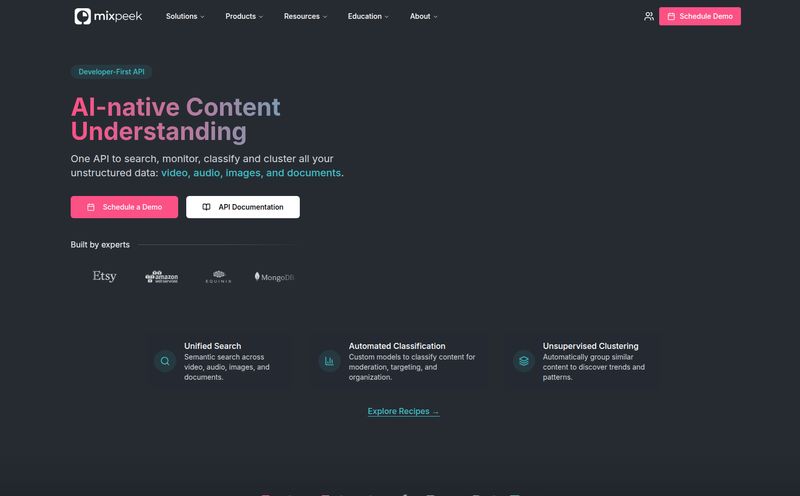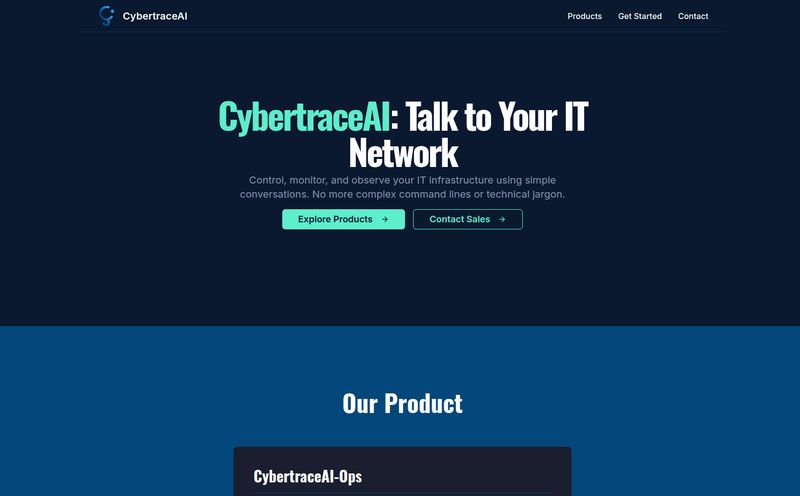You’ve been there, right? You spend days, maybe even weeks, crafting the perfect survey. You argue with your team about the phrasing of question #7. You meticulously set up the logic flows. You hit ‘launch’, hold your breath, and wait for the golden insights to pour in. And what do you get? A bunch of confusing, ambiguous, or just plain useless data because half your respondents didn't understand the question you spent three days writing. It's a tale as old as marketing itself. It’s painful.
For years, we've just accepted this as the cost of doing business. You throw your questions against the wall and hope enough of them stick to give you some direction. But what if you could have a crystal ball? What if you could run your survey past a million different personalities before it ever saw a real human eye? Well, the AI wave is bringing some interesting new toys to our sandbox, and one that recently caught my eye is called Reedback.
Another AI tool, you say? I know, I know. My inbox is flooded with them too. But this one... this one felt a little different. It’s not another content generator or a fancy chatbot. It's tackling a problem I've personally grumbled about for years.
So, What on Earth is Reedback?
In the simplest terms, Reedback is an AI-powered simulator for your surveys. You don't build a survey and send it to people with Reedback. You build your survey, and then you show it to Reedback. The platform’s AI then simulates how a diverse group of humans would likely respond, giving you real-time analysis on the spot.
Think of it like a flight simulator, but for marketers and researchers. You get to crash and burn in a safe environment, tweaking your questions, refining your language, and spotting potential disasters before you ever take off for real. It’s like having an instant, on-demand focus group living inside your computer, ready to give you feedback without the hassle of scheduling or the cost of gift cards.

Visit Reedback
The whole idea is to get a read on people's thoughts and opinions without, you know, having to actually go and find a statistically significant sample of people first. A pretty bold proposition.
How Does This AI Wizardry Supposedly Work?
From what I've gathered, the process is refreshingly straightforward. You take your survey questions—your precious, hand-crafted queries—and feed them into the Reedback system. Instantly (or near-instantly, because 'real-time' is a brave claim), the AI gets to work. It chews on your questions and spits back a simulation of human responses.
But it's not just about predicting a 'yes' or 'no'. The promise is deeper insight into why. Is a question confusing? Is the terminology jargony? Does your leading question accidentally push people toward an answer you didn’t intend? These are the kinds of gremlins this tool is designed to find. By simulating the thought process, you can theoretically iterate on your survey design at a speed that was just impossible before. You could test five different versions of a question in the time it takes to brew a cup of coffee. That's the dream, anyway.
The Good, The Bad, and The AI
No tool is a silver bullet, especially in the wild west of AI. I’ve been in the SEO and traffic game long enough to know that for every game-changer, there are a dozen shiny objects that don't deliver. So let's look at Reedback with a healthy dose of experienced optimism.
The Bright Side: Getting Ahead of the Curve
The most obvious win here is speed. The cycle of create-launch-wait-analyze is a massive bottleneck. Being able to get immediate, directional feedback is huge. It transforms survey design from a rigid, linear process into an agile, iterative one. For an SEO like me, this is fascinating. Imagine testing potential blog post titles or meta descriptions to see which one an AI predicts would generate more curiosity. That's a powerful way to understand user intent on a whole new level.
Then there's the insight quality. A bad survey question is like a poison pill for your data. It can invalidate an entire campaign. Spotting that one confusing question before you spend a dime on respondents? That’s not just a time-saver; it's a budget-saver and a sanity-saver. That is some serious ROI.
A Healthy Dose of Skepticism
Okay, let's ground ourselves. The biggest asterisk here is accuracy. The official line is that accuracy "depends on the AI model's training data." And that's the multi-million dollar question, isn't it? As we've seen in countless discussions about AI bias, the data an AI is trained on defines its entire worldview. If Reedback's AI was trained on a very specific demographic, how well will it simulate my target audience of, say, retired mechanics in the Midwest? It’s a black box, and we have to trust the chefs used good ingredients.
The other point, and maybe it's the old-school marketer in me, is that humans are weird. We're sarcastic. We're contrary. We lie on surveys sometimes just for the fun of it. Can an algorithm, no matter how sophisticated, truly capture the full, messy, beautiful complexity of a human ticking a box? I have my doubts. Reedback might tell you a question is clear, but it can’t tell you if it's boring, or if it reminds someone of their annoying boss. This is a tool for insight, not a replacement for real human connection.
Who is Reedback Actually For?
I can see a few groups getting really excited about this.
- Market Researchers & Product Managers: This is the obvious one. Testing product concepts, messaging, feature names... you name it. This could be a powerful first-pass filter before investing in large-scale quantitative studies.
- SEO & Content Strategists: Hello! This is my lane. Beyond just keyword research, we're always trying to get inside the user's head. I'd love to use a tool like this to test different content angles. For example, for an article about electric cars, should I lead with cost savings, environmental impact, or performance? Simulating responses to those angles could be incredibly valuable.
- Startups and Small Businesses: Let’s be real, most small operations dont have the budget for a 10,000-person panel from a major research firm. A tool like Reedback could provide affordable, directional data to help them make smarter decisions without breaking the bank. It democratizes pre-launch testing.
Let's Talk Money: The Reedback Pricing Question
So, how much does this magic crystal ball cost? Well, that’s the mystery. As of writing this, Reedback is playing its cards very close to the chest. Their website doesn't have a public pricing page. This usually means one of a few things: they might be in a closed beta, they might be focusing on enterprise-level clients with custom pricing, or they're just not ready to show their hand yet. My advice is to head to their site directly and see if you can request a demo or get on a waitlist. Pricing for new AI tools can also be all over the map, so it's hard to even speculate.
Reedback vs. Traditional Surveys: A Friendly Showdown
So, should you cancel your SurveyMonkey subscription? Not so fast. It's about using the right tool for the job. Here's how I see them stacking up:
| Factor | Reedback (Simulated) | Traditional Surveys (e.g., Google Forms, SurveyMonkey) |
|---|---|---|
| Speed | Instant / Real-time | Days to Weeks |
| Cost | Unknown (Likely SaaS fee) | Varies (Free to very expensive for panels) |
| Data Type | Predictive & Directional | Actual & Definitive |
| Best For | Pre-launch refinement, iteration, spotting flaws | Validation, gathering real-world data, segmentation |
Frequently Asked Questions About Reedback
Can Reedback completely replace my need for real human surveys?
Honestly, no. I see it as a powerful complement, not a replacement. You use Reedback to sharpen your spear, and then you use traditional surveys to actually go hunting. It’s for refinement and pre-flight checks, while real data from real people is for validation.
How accurate is the AI simulation?
This is the million-dollar question. The accuracy hinges entirely on the AI's training data. It's best to view the results as strong, directional insights rather than gospel truth. It can tell you if you're heading north, but it might not be able to pinpoint your exact coordinates.
Is Reedback difficult to use for non-technical people?
While I haven't used it personally, tools like this are generally designed for marketers, researchers, and product managers—not data scientists. I would expect a user-friendly interface where you can simply paste in your questions and get an easy-to-understand dashboard of results.
What kinds of questions can I test with Reedback?
Presumably, it would handle a wide range of formats, including multiple-choice, open-ended text questions, Likert scales (e.g., "rate from 1 to 5"), and ranking questions. The real power would be in its analysis of open-ended text, to simulate sentiment and common themes.
Final Thoughts: A Crystal Ball or Just a Magic 8-Ball?
So, what’s the final verdict? I'm cautiously optimistic. Reedback isn't a magic wand that will give you perfect, infallible answers. It's more like a very smart, very fast Magic 8-Ball that can give you a pretty good idea if the "Outlook is good" or if you should "Ask again later."
The real value isn't in replacing human feedback, but in augmenting it. It’s about making our real research more effective, more focused, and less prone to costly, unforced errors. For my money, any tool that saves me from the face-palm moment of realizing I launched a dud survey is a tool worth watching. Reedback is definitely on my watchlist. It represents a shift in how we think about research—from a slow, deliberate process to something more fluid and dynamic. And in the fast-paced world of digital marketing, that’s a change I can get behind.
Reference and Sources
- A helpful overview on AI bias from MIT Technology Review.



